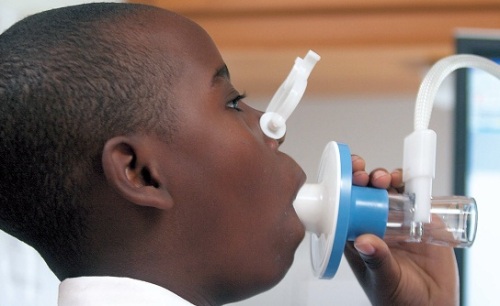Have you ever suffered from long-term itchiness that made you scratch all day long? Have you ever ran of breath all of a sudden and had to breathe even harder?
Chances are high that you have allergic rhinitis and eczema or asthma.
The American National Institute of Health depicts allergic rhinitis to be a collection of symptoms, mostly in the nose and eyes, which occur when someone breathes in something they are allergic to.
Those with allergic rhinitis tend to have an itchy nose, mouth, eyes, throat, and elsewhere, odor problems, runny nose, teary eyes, clogged ears and a decreased sense of smell, sore throat, dark circles under the eyes, puffy eyes, headache, fatigue or irritability, memory problems and slowed thinking, sneezing and cough often.
Atopic dermatitis is due to a hypersensitive reaction (similar to an allergy) in the skin and is most common in infants. People with atopic dermatitis often have asthma or seasonal allergies.
Chances are high that you have allergic rhinitis and eczema or asthma.
The American National Institute of Health depicts allergic rhinitis to be a collection of symptoms, mostly in the nose and eyes, which occur when someone breathes in something they are allergic to.
Those with allergic rhinitis tend to have an itchy nose, mouth, eyes, throat, and elsewhere, odor problems, runny nose, teary eyes, clogged ears and a decreased sense of smell, sore throat, dark circles under the eyes, puffy eyes, headache, fatigue or irritability, memory problems and slowed thinking, sneezing and cough often.
Atopic dermatitis is due to a hypersensitive reaction (similar to an allergy) in the skin and is most common in infants. People with atopic dermatitis often have asthma or seasonal allergies.

Asthma is a chronic disease that affects your airways. During an asthma attack, the walls of your airways become sore and swollen, which makes them sensitive and react strongly to things you are allergic to or find irritating. This can cause wheezing, coughing, chest tightness and trouble breathing, especially early in the morning or at night.
According to the Ministry of Health and Welfare, about 3.7 percent of people over 1 year old have been diagnosed with asthma. The figure rose to 6.1 percent for atopic eczema and 11.9 percent for allergic rhinitis.
These ailments have become an obstacle for children and teenagers. Among those aged between 13 and 18, 9.2 percent had asthma, 23.1 percent had atopic eczema and 33.9 percent had allergic rhinitis. They often had to miss school and complained that they could not focus on their studies.
“Moreover, severe asthma patients spend around 6.5 million won a year in treatment. The socioeconomic costs of such diseases are expected to be even higher,” Na Sung-woong, a ministry official, aid.
Local governments have designated a total of 461 “Atopy/Asthma-free schools,” nationwide where hygiene management has been prioritized to stem the diseases prevalence on campus.
The Korea Centers for Disease Control and Prevent is also running an information center alongside the educational offices of Seoul and Gyeonggi Province.
The KCDC announced a set of guidelines for prevention and decent management of allergic diseases and asthma.
1. Always be careful about skin care: Keep your bath water warm and don’t exceed 20 minutes in the water. Do not scrub your skin too hard. Apply moisturizers twice a day within three minutes from bathing. Wear all cotton clothes and keep your nails short and clean.
2. Control stress as much as possible.
3. Always maintain indoor temperature and humidity to a certain level.
4. Use verified and confirmed treatments only.
5. Do not smoke. Don’t even get close to people who are smoking. Secondhand smoke could trigger an asthma attack.
6. Exercise regularly and try to control your weight.
7. Pay extra attention to personal hygiene. Hand washing often is important, and always keep your house clean and tidy.
8. Refrain from going outdoors when air pollution, including yellow dust, is severe. If you have to, wear a mask.
9. Always keep anti-asthma treatments with you. Record the dosage.
10. Breastfeeding could reduce the prevalence of asthma or atopic eczema in babies.
11. Like any other disease, early screening, diagnosis and treatment are important. Visit nearby doctors when symptoms are detected.
For more information about atopic eczema and other allergic diseases, visit http://atopy.cdc.go.kr.
By Bae Ji-sook (baejisook@heraldcorp.com)
-
Articles by Korea Herald



![[Exclusive] Korean military set to ban iPhones over 'security' concerns](http://res.heraldm.com/phpwas/restmb_idxmake.php?idx=644&simg=/content/image/2024/04/23/20240423050599_0.jpg&u=20240423183955)

![[Graphic News] 77% of young Koreans still financially dependent](http://res.heraldm.com/phpwas/restmb_idxmake.php?idx=644&simg=/content/image/2024/04/22/20240422050762_0.gif&u=)



![[Pressure points] Leggings in public: Fashion statement or social faux pas?](http://res.heraldm.com/phpwas/restmb_idxmake.php?idx=644&simg=/content/image/2024/04/23/20240423050669_0.jpg&u=)










